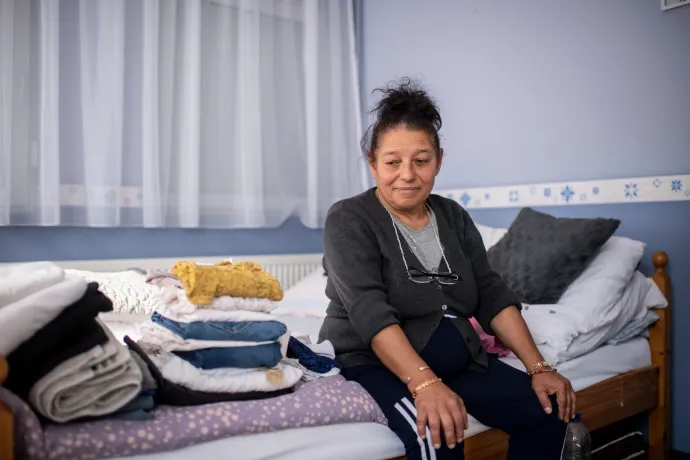
- In 20 years over a quarter of the EU's population will be over the age of 65 – which makes the provision of care for the elderly an increasingly pressing issue.
- Most of this care work currently falls to the women within their respective families, but in households with more money, such work may be carried out by women outside the family.
- A consequence of this situation is the flow of – mainly female – labor from East to West, known as caregiver migration.
- Just as in the past it was the work done by poor maids from villages that enabled the women of wealthy middle-class families to be liberated from the invisible work at home, today it is the largely undocumented work of migrant female caregivers that allows male and female members of more affluent families to occupy more prestigious positions in the official labor market.
- Hungary finds itself in a rather peculiar situation, with many caregivers arriving from countries to the east, such as Romania, but at the same time, many are also leaving Hungary for work in the West.
- One-third of all Hungarians know a woman who works abroad as an elderly caregiver or nurse.
In preparation for this article, we conducted interviews in Hungary and Romania. In total, we spoke to fourteen women affected by this phenomenon, and our goal was to present the situation based on their personal stories.
"When my daughter was 16 years old, I said that she had to make a choice: either I stay home with her and we have no money, or I go get a job and we have no problems making ends meet. She gave it some thought for a day and finally said: 'Mom, I want you to stay, but also I want us to have money,'" recounts Zsóka, a woman from southern Hungary, near the Serbian border. Their conversation took place years ago. Zsóka is one of the many Eastern European women working in the West who have been commuting abroad for years, making a living as elderly caregivers. Her story serves as a classic example of what is known as caregiver migration. After obtaining her degree, she started working as a public clerk (or, as she puts it, a government servant) for many years. However, she found it increasingly difficult to make ends meet with her salary from the employment office as a result of her soaring mortgage payments. The last straw came for her when she found herself on payday already 60,000 forints in the negative. She was in her fifties when she set off to work as an elderly caregiver abroad, and over the past 7 years, she has worked in Germany, Austria, and Canada.
"For me, this path wasn't a choice. I had to get on my feet. I had a lot of debt – money was the only thing that motivated me to do this," she said, explaining why she headed abroad with no foreign language skills. She started out as a caregiver – in her own words, "digging through shit all day long", but she got into the swing of things and recounts her experience as one of success, having recovered financially in a few years. In the meantime, Zsóka's daughter has grown up and is working as a registered nurse – also in Germany, but rather than commuting she has settled down there. Zsóka is now having a house built in a village near Baja and doesn't plan on coming home as long as she can cope with the work abroad. "I've given up on the idea of working in Hungary because 130,000 forints [~320 euros] a month just isn't worth it."
Informal networks and double lives
Magdolna lives in Comandău, Transylvania (Romania). When she applied for her state pension she found that due to poor administration prior to the fall of communism, she had only one year of work in the official register instead of around 15 years, which was not enough to qualify for a full pension. "We also had to pay the bank, and I wanted to support my children as well. And my husband's pension was simply not enough," she explained. Magdolna is not the only one in the region who has had such an experience. It is not uncommon for women of retirement age to move from Transylvania to Hungary to care for or look after even older people because they receive little to no pension back home. For example, Emma, also from Comandău, receives 800 lei (roughly 165 euros at the current exchange rate), which is not even enough to buy firewood for heating. For women making the commute from Eastern Europe to the West, elderly care is often the last hope to provide for themselves and their families or to support children and grandchildren financially.
We spoke to others in Transylvania who see working abroad as more of a tradition, as they are following their parents' example by taking on elderly care and/or housekeeping. As early as the 1970s, during the Ceaușescu dictatorship, women from the village of Sic traveled en masse to Budapest to market their needlework. To this day, the village is known for the fact that the older women continue to wear traditional costumes and make embroidery even on weekdays. They told us that after the fall of communism, interest in their commodities in Budapest dwindled. So, with the help of acquaintances and thanks to their contacts in the big city, they took up cleaning jobs for wealthier families and even worked in elderly care when the need arose. They were later joined by their daughters, which meant that in many places, a household was looked after alternately by mother and daughter.
Regardless of whether or not they have a nursing qualification, Transylvanian women working in Hungary perform roughly such tasks, in accordance with the senior's age and the needs of the family. They are usually responsible for administering medicines and washing the elderly. When it comes to those who are bedridden, caregivers change diapers and lift, move, and keep the elderly clean so that they do not get bedsores. It's demanding physical work, which is why it's quite surreal that the caregivers are often senior citizens themselves: women going on 70 lifting 85-year-old individuals who are unable to care for themselves. Occasionally, those we interviewed talked about how stressful the daily routine that they have to go through is. This is a result of the fact that most of the time, the patient's family members are only able to visit on a weekly basis, perhaps even less often. Magdolna said that now she can only work with seniors who can still move around due to a spinal injury she got from her intense work. "But as long as my health permits me to do so, I'm going to keep at it," she quickly added.
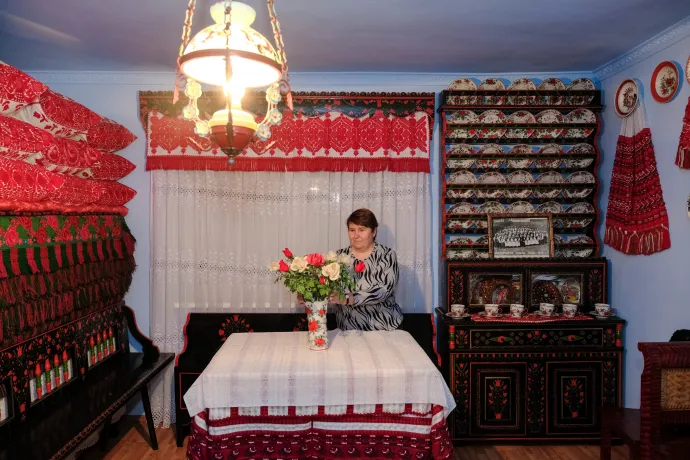
However, they find the emotional challenges of cohabitation and caregiving more difficult than the physical ones. For example, the majority of the Transylvanian women complained about how complicated it was to adapt their cooking habits to the family's diet: after all, grocery shopping, cooking, and feeding are also very important aspects of patient care. But there were also examples of host families degrading, exploiting, or abusing these women. Elderly caregivers from Hungary talked about situations where, even though certain tasks were not included in their job description, they found themselves repeatedly expected by their families to do all the work around the house. "For one Austrian farmer, I had to chop wood, pick apples, and clean out the chicken coop," recounts one caregiver, Ági, who commutes to Austria. She said it's hard to say no to such tasks when you're afraid of losing your job. Sometimes they are not allowed to sit down to eat at the family table or join their patient when they're watching TV. There have been times when people have said to Ági, "Those who are on the job shouldn't be goofing off."
There were even cases where a caregiver didn't receive a room of their own and had to make do with a camp bed set up in the kitchen. But that's not the most shocking situation that we heard about. Emma and Magdolna worked for the same elderly man, who for some reason urinated in their coffee cups at night and sometimes even soiled their cutlery with his feces.
"He was perfectly normal during the day. He discussed legislation and talked to doctors. But at night, it was like he had been replaced by someone else. He did things that I just couldn't take anymore,"
– recalls Emma, another native of Comandău. But if the match between the two parties works out, the employed becomes a caring partner – often the only one – who has a genuinely trusting relationship with the elderly person entrusted to them. After all, the elderly often require attention, consideration, and patience just as much as they need to have their physical needs met.
The close relationship is also due to the fact that these foreign work arrangements "spread by word of mouth, like a folktale." This is how Tünde Turai put it in her 2018 book Hierarchiák fogságában [lit. Trapped in Hierarchies], which is about how women in Eastern and Central Europe participate in the global elderly care system. Referrals from acquaintances are also particularly important to the "clients", i.e. the host families, as it is a matter of considerable trust when, in effect, an absolute stranger is brought into the house and left alone with a vulnerable, elderly family member. We also came across the phenomenon described by the researcher, as all but one of our interviewees talked about informal job placement – even if they worked based on semi-formal contracts with the help of an intermediary. It wasn't through job ads that they find out about opportunities abroad but through people they know who already work there. On top of that, there are also specialized minibus companies for carers traveling from Hungary to Germany or Austria and from Romania to Hungary. Such companies sometimes not only facilitate the journey but also step in as unofficial intermediaries.
According to Kinga Milánkovics, economist and co-founder of the Hekate Conscious Ageing Foundation, the role of informal networks in the field of elderly care is also gaining in importance in Hungary because families are usually unprepared when an elderly family member is suddenly unable to care for themselves due to illness, accident or hospitalization. In such cases, families often find themselves in logistical situations that are difficult to resolve and naturally try to seek help through their contacts.
The Transylvanian women who were recruited via acquaintances said that they were not afraid when they set out because their relationships based on trust made them feel less vulnerable. This is helped by the fact that they speak the same language as their clients in Hungary, and also by the fact that there is a well-established infrastructure for their return home, meaning that it is relatively easy for them to make their way back from a bad place. The scenario is similar for those traveling westwards from Hungary, but in their case, the role of acquaintances may be even more important due to a lack of language skills. For example, Zsóka did not know a word of German before she started venturing out, which is why she asked for help from a friend, her daughter's school principal, who she knew "had some relatives working abroad." Just three days after their meeting, she found herself in Austria. Among those we interviewed, Ági was the only one who had applied for a specific job posting once she had her qualifications and language certificate.
Regardless of whether they are heading westward from Romania or Hungary, the women who are caring for the elderly are constantly in transit. That is, while they're abroad, most of them work practically 24-hour shifts for 3-4 weeks, virtually non-stop, with a few hours of rest a day. Then they get the same amount of time to rest back home. In some cases, they may work for 2-3 months consecutively and return home for only one month. The length of time spent working is influenced by a number of factors: distance, homesickness, whether there are children or other family members waiting for them at home, as well as financial constraints. It often happens that if a caregiver needs more money, they will do a double shift before heading home – thus saving money on travel and earning more but wearing themselves out more at the same time.
For most women, the decision to leave home is difficult not only at the outset. Many described a conscious effort to separate their two spheres of life. In fact, they lead a double life out of self-preservation: when they are abroad, they concentrate on work and try to put home-related matters out of their minds, and when they return home, they try not to think about work.
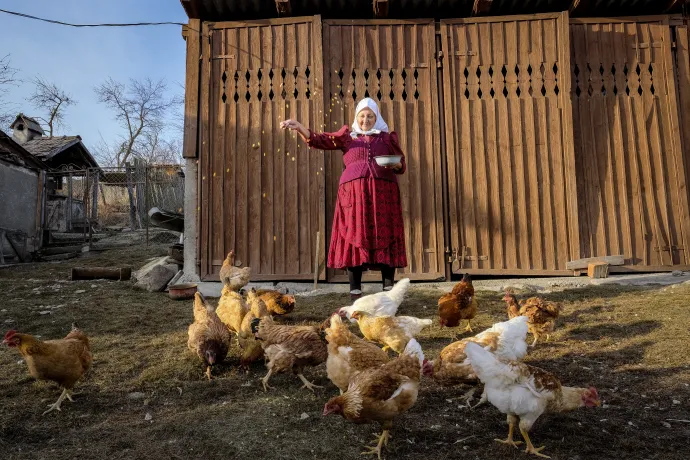
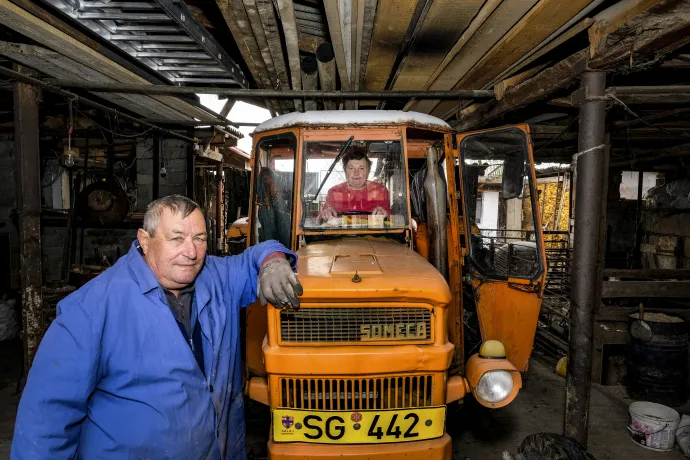
"I had no other choice but to leave my family, my son, at home, which was emotionally devastating for me. My boy was young, and he was crying that his mother was going away. Fortunately, our grandparents helped out, and my husband stayed at home. But I had to go. There was no other way. I left with a heavy heart. After that, every time I would head out from the village, I would keep telling myself to leave this feeling at home. I couldn't stop thinking about that last day when my son asked me a hundred times, 'Mom, why are you going?' It's impossible to work with a thought like that," said Mária from Sic, who, following in her mother's footsteps, mainly worked as a housekeeper in Budapest but sometimes took over for her in elderly care.
In post-communist Transylvania, it was typical for the children left behind to be raised by grandparents or other relatives. This is because even fathers often went abroad to work, mainly in the construction and agricultural sectors. However, as the economic boom took off, the men returned to their homeland, as there were plenty of construction projects where they could find work. Sara Nagy from Sic said that in her household the responsibility of taking care of the family was borne by the children, especially her daughter, who cooked for her father and brother alongside her high school studies. The only families in which the men took care of themselves and the household were ones with no women left at home at all: "...while the boys were in school, the three of them made up for the work of one woman. They did the housework. They got used to the cooking, the chores, and the laundry. But now that the children are working, it would be very hard for my husband to be home alone," says Zsóka from Sărmășag.
Hungary: the West for Transylvanian women
With Europe's aging population, current projections show that by 2040, more than a quarter of the EU's population will be over 65. Life expectancy is rising, and the proportion of older people in EU countries who have difficulty in carrying out everyday tasks is already high. According to 2015 data, one-third of people over the age of 75 have serious difficulty walking and one-tenth have difficulty preparing food. Within this same age group, 9.3% are severely visually impaired and 19.1% are severely hearing impaired. In other words, there are already many people in need of help due to their age, and that number is only going to increase in the near future. Experts estimate that by 2050 there will be two million fewer caregivers in Europe than there needs to be.
So the question of how to care for the elderly is becoming increasingly pressing. And today, to varying degrees from one country to another, this is a matter for families or the state, or perhaps for churches or profit-driven entities. According to Tünde Turai, a researcher on caregiver migration, cultural norms and moral expectations often dictate that the elderly should be cared for at home in a family environment. Except that the women who used to do this work for free are now much more likely to be working for a wage themselves, i.e. away from home. More affluent families overcome this situation by paying for care work. Outsourcing this work has several quality-of-life benefits for families. For older people, for example, this model can ensure that they do not lose control over their own lives, while second and third-generation members can continue to live their lives as before.
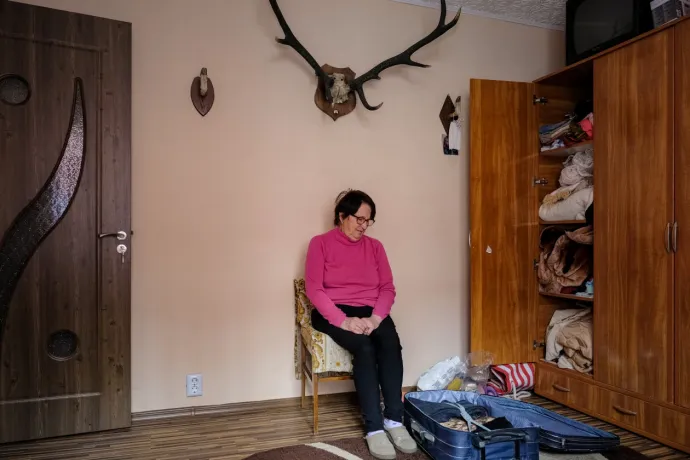
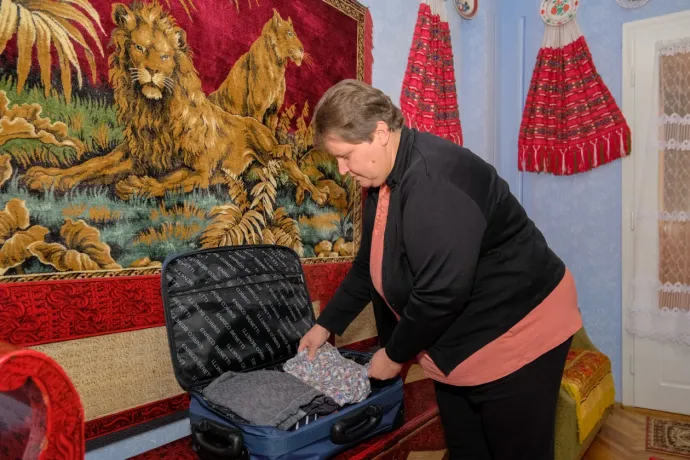
According to a 2014 survey, one-third of people over 75 in France and Belgium have made use of home nursing services, while in the Baltic States, Croatia, and Romania this figure is less than ten percent. One reason for this may be that the workforce providing elderly care often travels from Eastern Europe to the continent's wealthier countries.
In this respect, Hungary occupies a unique position as it is both a source and a destination country in the caregiver migration market.
While there are Hungarian villages of 2,000 people where half to one-third of the families may be affected by the employment of women abroad as elderly caregivers, at the same time caregivers from Ukraine and Romania (mainly from Transcarpathia and Transylvania) commute to look after Hungary's elderly. Hungary is in this unique position thanks to its historical circumstances: the country can rely to a certain extent on the relatively cheap workforce of Hungarian women from abroad. Although Hungary's population does not have enough money to make the wages of elderly care work here competitive with those in northern and western Europe, even the modest wages can be appealing to Hungarians across the border. After all:
- dual citizenship alleviates some of the administrative red tape;
- Hungarian-speaking women from Transylvania and Transcarpathia face a much smaller language barrier, are able to communicate immediately with patients, clients, and intermediaries, and are therefore somewhat less vulnerable than if they were to head for Austria or Germany, for example;
- they don't feel like they have to find their place in a "foreign" culture – but rather in the "motherland";
- on top of that, the physical distance between home and work is shorter, so travel time and costs are lower than for more distant countries.
While elderly care and qualified nursing care often involve hard physical work, and the fact that leaving home behind and migrant work undertaken to care for families is typically seen as a more masculine task, caregiver migration nevertheless tends to mobilize women. According to Tünde Turai, this is because, despite feminist efforts in recent decades, domestic chores are still considered "women's work". In part, this is due to the fact that the ideal qualities associated with caregiving (e.g. kindness, humanity, a loving attitude and patience) are typically considered feminine. It is also partly because care work is seen as simple, unskilled jobs for which people do not want to pay (much), hence the term "invisible work".
When Hungarians were asked about what sort of tasks they would pay people to do, it is clear that the ones that are typically considered to be household chores (cooking, washing, cleaning, childcare, mowing, and felling) are the ones that most would not pay for, even if they were done by someone outside the family. This is in contrast to, for example, house painting, bricklaying, various kinds of installation work, haircuts, food delivery and other kinds of delivery services, which most people see as paid work. From this point of view, home elderly care and nursing care split Hungarians. According to a nationally representative survey by Závecz Research at the request of Telex, 45% would pay for the former while 54% wouldn't, and just as many people would not pay for the latter as those who would.
Eszter Meszleny, one of the founders of Non Tu Solus ("You are not alone"), a company that helps to place caregivers from Transcarpathia and Transylvania in Hungary, also believes that the reason why the majority of people in this profession are women is that some of the tasks of running a household are frequently associated with the role of a caregiver. Besides, "seldom would the family of an 80-year-old woman invite a man they didn't know to go to her house to give her a bath and change her diaper," adds the other co-founder, Veronika Udvaros, explaining why there is not much demand for men from families. In Eszter's and Veronika's work to date, there have been only a few rare exceptions where a male caregiver has been explicitly requested. One such case was when help was sought for a priest who had spent his whole life in the company of men because of his vocation and who simply could not imagine that this situation would change in his later years.
"I'm doing a job that no one else is doing there"
Care work performed by migrant women is generally regarded as being of low prestige. Apart from the fact that such work is labeled as "feminine", this is also strongly linked to the significance of the global West-East dichotomy in the public consciousness. According to Tünde Turai, research shows that people often perceive "Eastern" women in this context as simpler, poorer, less urban and less independent/autonomous, and thus ultimately better suited for care work, even in other people's homes.
"I'm doing a job that no one else is doing there, yet they speak to me in a foul way," says Ági, a qualified nurse who has worked as a residential care worker in Austria for more than 10 years. Her experience has been that, even though Germany and Austria welcome foreign workers in certain sectors,
these countries are only welcoming in speech and political slogans. "We were treated more or less as if we lived in caves,"
– she explains. She believes that part of the reason for this is that for her Austrian employers, it is inconceivable that someone in Hungary could raise a child with the money they pay and at the same time build a nice house.
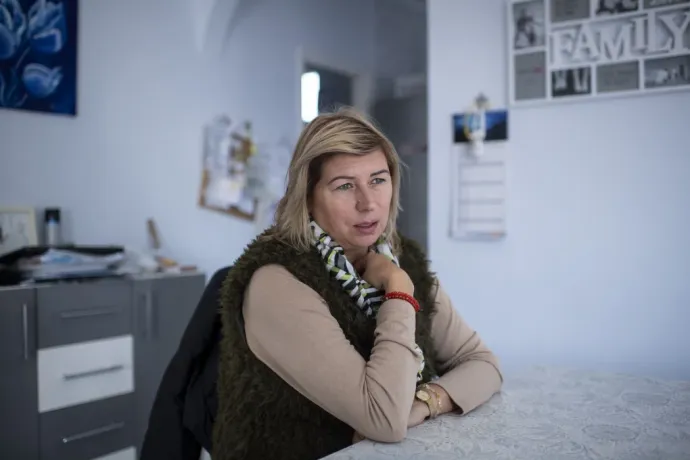
Just as poor, vulnerable women used to move from the countryside into the homes of urban families to work as domestic servants, they are now streaming from Eastern to Western Europe to work as elderly care workers, according to Krisztina Németh's study. At the turn of the last century, it was the work done by poor maids from villages that enabled the women of wealthy middle-class families to be liberated from the invisible work at home. Now, it is the largely undocumented work of migrant female caregivers that allows male and female members of more affluent western families to occupy more prestigious positions in the official labor market. Other features common to residential care and domestic service are round-the-clock working hours, the necessity of cohabitation, and the fact that caregivers who start from a lower social position are temporarily removed from their own social milieu and live at arm's length from the trappings of a better way of life yet do not become integrated into it. They thus tend to isolate themselves, which can leave them vulnerable and defenseless against various forms of abuse, both physical and mental.
In countries where domestic servitude was still common just a few generations ago (apart from Hungary, this includes both Germany and Austria), those being cared for over the age of 90 were once children in families that had maids. In many cases they can still remember such experiences, and so now they might even order their caregiver about, treating them almost as a servant – says Udvaros, a member an organization that as an intermediary for caregivers from Transylvania. She later adds that, on the other hand, it is not uncommon that
"caregivers from Transylvania or Transcarpathia also have a servile mentality, sometimes referring to the head of the family, who pays for the care, as 'master'."
A crucial difference, however, was that the domestic servants were specifically young, unmarried women who were laying the foundation for their future. However, the caregivers migrating from the East to the West tend to be of an older age group. For example, those coming to Hungary from Transylvania are primarily retired women, and those leaving Hungary tend to be at least middle-aged and often leaving behind families and children of their own. For them, this is not a chance to make a start – not a way of establishing a life – but rather an option forced onto them. As Zsóka from Baja puts it:
"It's a profession chosen by people on the margins of society, people who are very poor, deep into debt, whose pension payments are not sufficient, who are fleeing a bad relationship, or who, as gypsies, don't see any other job opportunities and would like to make their way up the ladder."
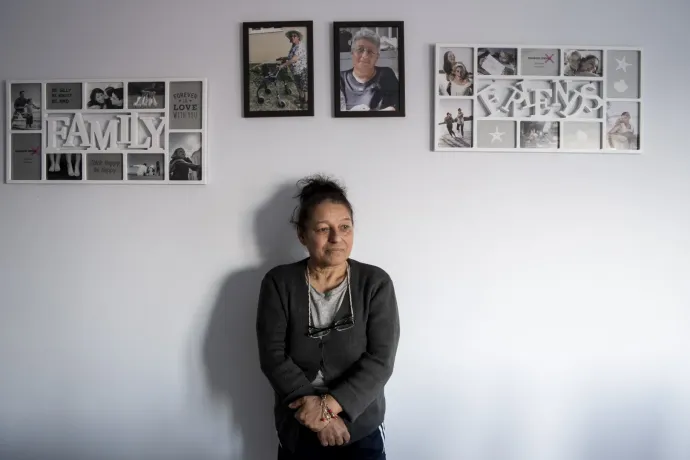
Both Hungary and Romania have communities where elderly care work abroad constitutes an important source of income for the majority of families. In Hungary, for example, this is the case with the village situated in the Great Hungarian Plain that is the subject of Monika Mária Váradi's 2018 study entitled "Kisfalusi nők a globális gondozási piacon" [lit. "Women from small villages in the global care market"], but during our own reporting in Transylvania we also witnessed this in Comandău, Covasna County, and in Sic, Cluj County. In these areas, commuting and care work is a day-to-day reality. Even for those who do not make a living from it, they consider it a fact of life. But in places where it is considered less natural, caregivers often find that their work is judged on the basis of negative stereotypes and misconceptions:
"In Hungary, they think we are all whores, and that there isn't any other line of work abroad besides that. They are also jealous, if they see you getting ahead in life – they think that money just grows on trees there. It doesn't matter how many times I say that it's not money that grows on trees but diapers. But I don't pick a fight with them. People like that drift away – we stick together," says Ági, who works in Austria. According to her, this way of life is only understood by those who have lived it or are living it. It's no coincidence that one of her best friends is Zsóka, the caregiver working in Germany, about whom she comments: "I admire Zsóka because she also works and keeps going until her last drop of blood."
The problems have only worsened with the coronavirus
And when coronavirus pandemic hit Europe, we could immediately see the precariousness of the situation – one that relies on the cheap, often only partly declared or even entirely unregistered labor of women from Eastern Europe: many caregivers decided to look for work close to home rather than commuting. At times, border closures made travel impossible, restrictions made it difficult to carry out work, and the risk of infection made the situation for caregivers particularly hazardous. For undocumented workers, a single medical examination or treatment without insurance can cost a fortune, but even for those working legally, it is often true that a period of several weeks of recovery or quarantine would result in an excessive loss of income, because this profession typically has no sick leave.
"My colleague and I were also scared about what would happen when, back in the spring of 2020, she had to swap out but was stuck abroad, and I was stuck at home," recalls Mária, who had been working as a residential elderly care worker in Switzerland for several years when the epidemic struck. "But as soon as the rules about what had to be done were introduced, the family of the person we cared for took care of all the red tape. So we could come and go without any problems, we just had to bring a few more documents with us." Even last October, she wasn't asked for a test result at the border, her employment contract was enough to allow her to travel. But around this time she too got stuck abroad, as she and the 87-year-old she was caring for both got infected. They were cooped up for six weeks before they both recovered, but Mary was still lucky. She was still paid for this period, the state helped to care for her client, and the family brought them food during the quarantine.
The first wave was also "pretty rough" for the Transylvanian caregivers who usually worked in monthly or bi-monthly shifts. Many of them are stuck in Hungary. Some of them could not go home for 6-9 months – recalls Meszleny. After they did manage to get home, many decided not to take any risks and just stay there. Some of them have stopped caring for the elderly altogether, while others have gone on to look for similar work locally. When the vaccine came out, Esther and Veronika's intermediary company informed the caregivers that they could help find work for those who had been vaccinated, and once again, more and more workers are headed out to take care of patients at home.
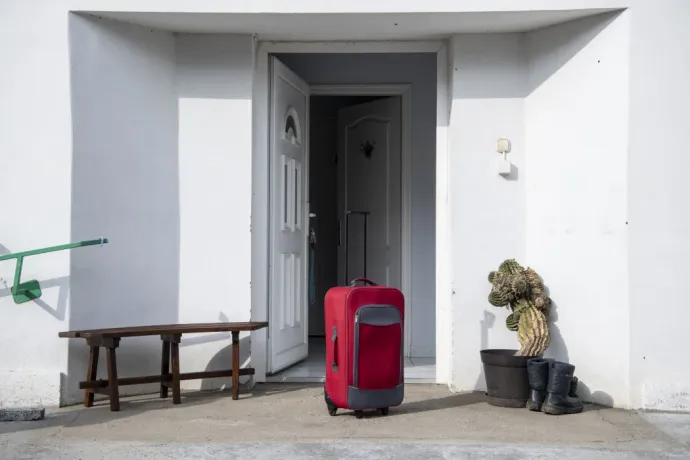
Since the beginning of the pandemic, Non Tu Solus has seen an increase in demand for in-home elderly care. It has become more and more common for families to seek care for elderly people in more serious conditions because they fear that if they are admitted to a hospital, they will not be able to visit them in the event of another quarantine. According to Esther and Veronika, the strain on the health system is also reflected in the fact that it is not uncommon for people who were admitted to a hospital when they were still fit and able to care for themselves to become long-term bedridden patients after discharge.
Women working abroad as elderly care workers find themselves in the so-called secondary labor market, where it doesn't matter what qualifications and experience they have, but they usually have no career prospects either. They often work in the black economy – not always simply in order to evade taxes, but also because they are often unable to navigate the bureaucratic maze without adequate language skills and knowledge of the region. In some cases, they themselves don't even know if their papers are in order. The undocumented nature of their work makes them even more vulnerable, and also makes it difficult to measure exactly how many women and families are affected by this particular type of migration within Europe. A representative survey carried out by Závecz Research at the end of last November reveals that roughly a third of Hungarians know a woman who works abroad as an elderly caregiver or nurse.
In many cases, women in Eastern Europe take up elderly care abroad for long-term objectives: to pay off debts, supplement their pension, support their children, build a house and so on. But the money they earn is only high in terms of their previous living conditions. The systemic problems that cause them to travel are typically not resolved in the long run by a few years of work abroad. This is why it is very common for elderly caregivers to keep commuting for as long as they can mentally and physically bear the work, or until someone from their own family back at home requires care themselves. Care migration fills an important gap in more privileged societies, but experts have been warning for years that such a system is unsustainable.
Závecz also found that a majority of Hungarians (54%) currently believe that the financial burden of elderly care should be borne by the state. 26% think that the families of those affected should be the ones paying, 14% said that the individuals affected should pay for it themselves, and 4% would leave it to private insurers. Two percent of respondents said they were not sure who they should pay.
This article was made possible by the collaboration between Telex and Transindex and thanks to the NewsSpectrum fellowship programme supported by the International Press Institute and MIDAS.
If you enjoyed this article, and want to make sure not to miss similar ones in the future, subscribe to the Telex English newsletter!